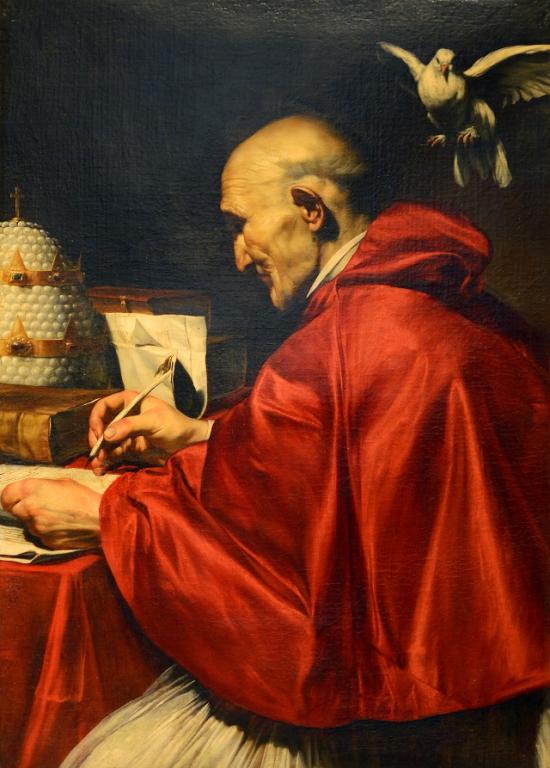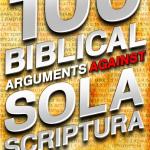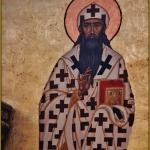
Protestant anti-Catholic polemicists David T. King and William Webster are the editors of a three-volume series, entitled, Holy Scripture: The Ground and Pillar of Our Faith (self-published by Webster’s outfit, Christian Resources Inc. [Battle Ground, Washington] in 2001). I’m most interested in Volume III: subtitled, “The Writings of the Church Fathers Affirming the Reformation Principle of Sola Scriptura” (edited by both Webster and King). In the Introduction to Vol. III (p. 9) they make the fantastically absurd, demonstrably false assertion:
[T]he Church fathers . . . universally taught sola Scriptura in the fullest sense of the term embracing both the material and formal sufficiency of Scripture.
The definition of sola Scriptura, according to three of the most able and articulate Protestant defenders of it in our time, is the following:
[T]he Bible alone is the infallible written authority for faith and morals (Norman Geisler)
Scripture . . . is the only inspired and inherently infallible norm, and therefore Scripture is the only final authoritative norm. (Keith A. Mathison)
The doctrine of sola scriptura . . . is that the Scriptures alone are sufficient to function as the regula fidei, the infallible rule of faith for the Church. (James R. White) [my bolding; see the sources for these quotations and also a fuller explication by each man]
Such a definition entails also understanding what sola Scriptura is not. It logically rules out tradition, the Church, ecumenical councils, bishops, popes, or appeal to apostolic succession as infallibly and finally authoritative. Only the Bible is that. Therefore, if any Church father believes that any of these are infallible or a final authority, then he (by the same token) does not and indeed cannot believe in sola Scriptura. I didn’t “set the rules”. Protestants have by defining sola Scriptura as they do. Thus, they have to live with their own definition and unbiblical rule of faith.
I shall be examining (in this series of papers) several Church fathers that Webster and King bring up, and documenting that they rejected sola Scriptura. I’ve already done this documentation with regard to Augustine, Athanasius, John Chrysostom, Jerome, Ambrose, Irenaeus, Justin Martyr, Clement of Alexandria, Hippolytus, Dionysius, Basil the Great, Cyril of Jerusalem, Theodoret, Gregory of Nyssa, Tertullian, Origen, Gregory Nazianzen, Epiphanius, Lactantius, Cyprian, Papias, Hilary of Poitiers, and John Damascene.
All citations are from Volume III unless otherwise indicated.
*****
God . . . fashions His word in such a manner, as to satisfy the enquiries of all men. . . . He includes in holy Scripture whatever can possibly befall each one of us, . . . (Morals on the Book of Job [Oxford: John Henry Parker, 1847], Vol. 3, Part 5, Book XXIII, pp. 29-30) [p. 138]
God delivers therein [in Scripture] all that he wills, [so] they may not be at variance with His will, in proportion as they learn that will in revelation. (Ibid., Vol. 2, Parts 3 & 4, Book XVI, Chapter 35, p. 252) [p. 136]
[H]eretics . . . broach things which assuredly are not maintained in the page of the sacred books. (Ibid., Vol. 2, Parts 3 & 4, Book XVIII, pp. 343-344) [p. 136]
These are citations that Webster and King included under “material sufficiency.” Catholics would have no problem with them at all. They certainly don’t prove sola Scriptura in any way, shape, or form.
Besides, since with the heart man believeth unto righteousness, and with the mouth confession is made unto salvation, I confess that I receive and revere, as the four books of the Gospel so also the four Councils: to wit, the Nicene, in which the perverse doctrine of Arius is overthrown; the Constantinopolitan also, in which the error of Eunomius and Macedonius is refuted; further, the first Ephesine, in which the impiety of Nestorius is condemned; and the Chalcedonian, in which the pravity of Eutyches and Dioscorus is reprobated. These with full devotion I embrace, and adhere to with most entire approval; since on them, as on a four-square stone, rises the structure of the holy faith; and whosoever, of whatever life and behaviour he may be, holds not fast to their solidity, even though he is seen to be a stone, yet he lies outside the building. The fifth council also I equally venerate, in which the epistle which is called that of Ibas, full of error, is reprobated; Theodorus, who divides the Mediator between God and men into two subsistences, is convicted of having fallen into the perfidy of impiety; and the writings of Theodoritus, in which the faith of the blessed Cyril is impugned, are refuted as having been published with the daring of madness. But all persons whom the aforesaid venerable Councils repudiate I repudiate; those whom they venerate I embrace; since, they having been constituted by universal consent, he overthrows not them but himself, whosoever presumes either to loose those whom they bind, or to bind those whom they loose. Whosoever, therefore, thinks otherwise, let him be anathema. But whosoever holds the faith of the aforesaid synods, peace be to him from God the Father, through Jesus Christ His Son, Who lives and reigns consubstantially God with Him in the Unity of the Holy Spirit for ever and ever. Amen.” (Letter to John of Constantinople, Book I, Epistle 25)
Such a view of the infallibility of ecumenical councils is utterly contrary to sola Scriptura, which holds that only Scripture is infallible and our final authority.
St. Gregory the Great (being a pope himself) believed in Roman primacy:
Inasmuch as it is manifest that the Apostolic See, is, by the ordering of God, set over all Churches, there is, among our manifold cares, especial demand for our attention . . . (Letter to Subdeacon John; Register of the Epistles, Book III, Epistle 30; NPNF 2, Vol. XII)
Yet I exhort thee that, as long as some time of life remains for thee, thy soul may not be found to be divided from the church of the same blessed Peter, to whom the keys of the heavenly kingdom were entrusted and the power of binding and loosing was granted, lest if his benefit be despised down here, he may close up the entrance to life up there. (The Great Epistles, B IV, Ep. 41), in J. P. Migne, Patr. Lat., translated by John Collorafi)
[Y]ou must still strictly order them to observe all things after the pattern of the Apostolic See. (Book 4, Letter 36)
[I]t was right that the Apostolic See should take heed, with the view of guarding in all respects the unity of the Universal Church in the minds of priests. (Book 4, Letter 2)
This he did as knowing such reverence to be paid by the faithful to the Apostolic See that what had been settled by its decree no molestation of unlawful usurpation would thereafter shake. (Book 9, Letter 111)
He believed that the pope was the supreme head of the Church:
To all who know the Gospel it is obvious that by the voice of the Lord the care of the entire church was committed to the holy apostle and prince of all the apostles, Peter . . . Behold, he received the keys of the kingdom of heaven, the power to bind and loose was given to him, and the care and principality of the entire church was committed to him . . . Am I defending my own cause in this matter? Am I vindicating some special injury of my own? Is it not rather the cause of Almighty God, the cause of the universal church? . . . And we certainly know that many priests of the church of Constantinople have fallen into the whirlpool of heresy and have become not only heretics but heresiarchs . . . Certainly, in honor of Peter, the prince of the apostles, ‘the title ‘universal’] was offered to the Roman pontiff by the venerable Council of Chalcedon. (His Epistle 37 to Emperor Maurice, from Book V; from Monumenta Germaniae historica: Epistolae; Berlin: 1891 – , Vol. I, 321-322; cited in Jaroslav Pelikan, The Emergence of the Catholic Tradition (100-600), University of Chicago Press, 1971, 352)
[W]ithout the authority and the consent of the apostolic see, none of the matters transacted [by a council] have any binding force. (Book IX, Epistle 156; from Monumenta Germaniae historica: Epistolae; Berlin: 1891 – , Vol.II, 158; cited in Pelikan, ibid., 354)
Who could be ignorant of the fact that the holy church is consolidated in the solidity of the prince of the Apostles, whose firmness of character extended to his name so that he should be called Peter after the ‘rock’, when the voice of the Truth says, ‘I will give to thee the keys of the kingdom of heaven’. To him again is said “When after a little while thou hast come back to me, it is for thee to be the support of thy brethren. (Epistle 40; in Michael Winter, St. Peter and the Popes, Baltimore: Helicon, 1960, 66)
These positions are directly contrary to sola Scriptura, which is why Webster and King pretended that they didn’t exist. Infallible popes and councils don’t fit in with sola Scriptura: a view of the rule of faith that allows only one thing to be infallible and the final authority:
Holy Scripture.
***
Related Reading
Gregory the Great & Papal Supremacy (vs. Calvin #20) [6-25-09]
Did Pope Gregory the Great Deny Papal Primacy & Supremacy? [9-16-17]
***
Photo credit: St Gregory the Great by José de Ribera (1591-1652); Livioandronico2013 (3-5-17) [Wikimedia Commons / Creative Commons Attribution-Share Alike 4.0 International license]
***
Summary: Anti-Catholic Protestant polemicists Webster and King try to force Pope St. Gregory the Great into the “box” of sola Scriptura, but his views on “papal supremacy” and infallible ecumenical councils simply don’t logically allow for this to be the case.













